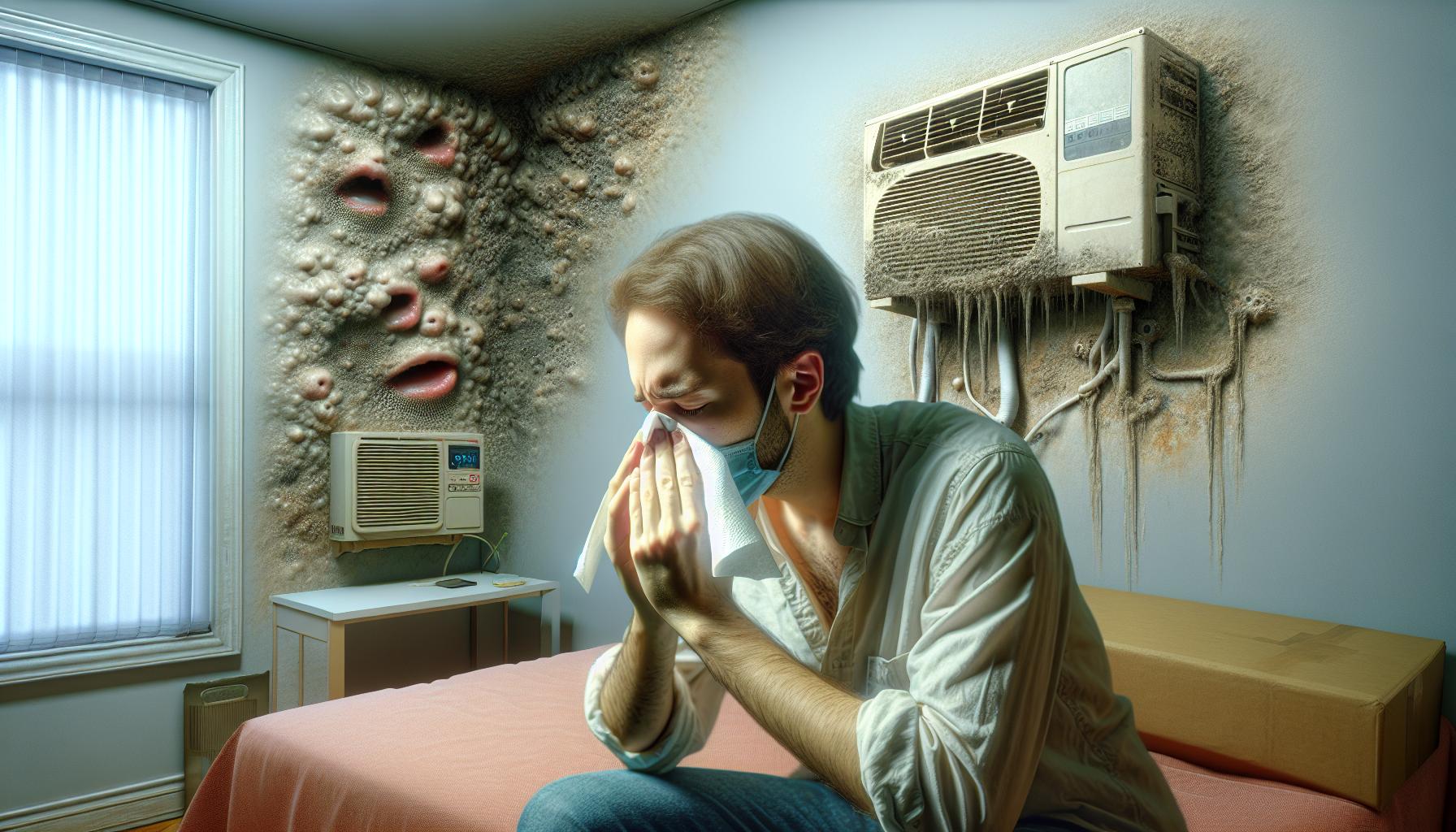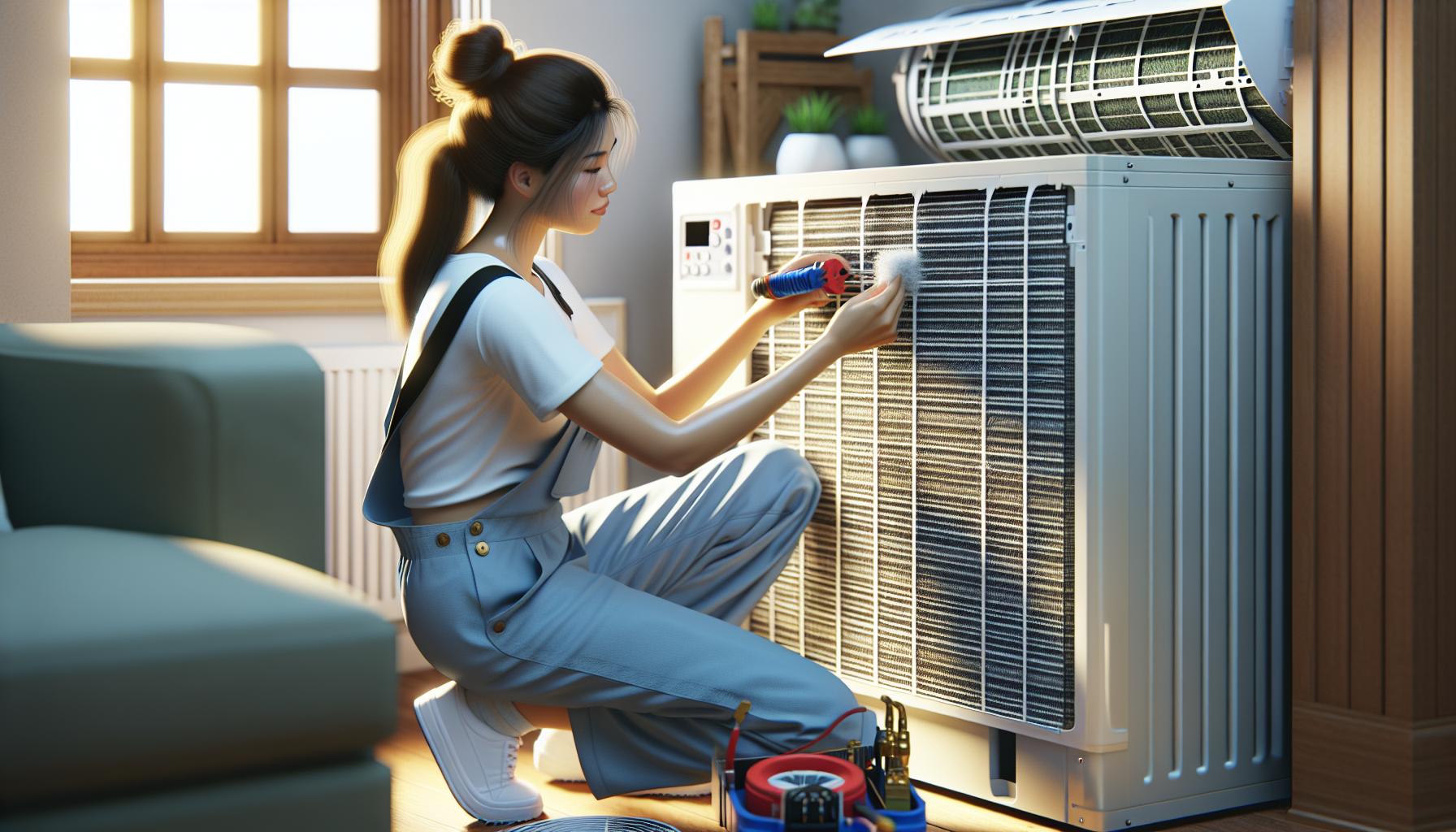Ever found yourself sneezing and coughing after spending a long day under the AC? Or maybe you’ve noticed a runny nose that seems to coincide with cranking up the air conditioning. It’s not uncommon to question if it’s the cold air that’s making you feel under the weather. But can an air conditioner truly make you sick?
While it’s a fact that cold air itself doesn’t cause illness, certain concerns linked to air conditioning and air quality may have you feeling less than your best. So, let’s investigate into the mystery of whether your beloved AC could be the silent culprit behind those pesky cold-like symptoms.
Key Takeaways
- Air conditioners themselves don’t cause illnesses, but poor indoor air quality linked to HVAC systems can cause Sick Building Syndrome (SBS), resulting in health issues tied to spending time in certain buildings.
- Poorly maintained HVAC units tend to accumulate pollutants such as volatile organic compounds (VOCs), chemicals, and particulate matter, potentially triggering SBS symptoms.
- Dirty filters and ducts in air conditioning systems can harbour mould, fungus, or other microorganisms, increasing the risk of developing SBS and exacerbating respiratory ailments like asthma and allergies.
- Contemporary ASHRAE standards raise minimum ventilation rates to improve indoor air quality, but neglecting maintenance or operating in poorly ventilated buildings still poses health risks.
- Adhering to manufacturers’ recommendations for cleaning or replacing air conditioning filters is crucial to prevent the system becoming a hotspot for harmful particles and microorganisms.
- Symptoms associated with HVAC-related illnesses can include visible mould growth, respiratory difficulties, mimicked cold symptoms, and skin irritations. Awareness and good maintenance practices are key to healthier indoor environments.
Understanding Sick Building Syndrome: The Role of Air Conditioning
Sick Building Syndrome (SBS) manifests as distinct health issues linked to time spent in a certain building, yet, it’s perplexing as no specific illness or cause is identified. You might not have heard of it, but it’s a prevalent concern. Regrettably, air conditioning plays a significant role in instigating this condition.
The primary offender in SBS scenarios is poor indoor air quality. Now, picture your heating, ventilation, and air conditioning (HVAC) systems as the leading culprits. They tend to pool indoor air pollutants such as volatile organic compounds (VOCs), chemicals, and particulate matter, chiefly when inadequately maintained. This accumulation results in stuffy air, unusual odours, excess humidity and inconsistent temperatures, all of which function as triggers for SBS symptoms.
The filters and ducts in your air conditioning system harbour potential concerns tied to their cleanliness. Predominantly, dirty filters potentially swarm with mold, fungus or other microorganisms. This not only escalates the risk of developing SBS but also tends to amplify respiratory ailments such as asthma and allergies.
Historically, ventilation standards facilitated the deduction of fresh outdoor air intake, a factor believed to have escalated SBS cases. Nowadays, contemporary ASHRAE standards have raised minimum ventilation rates, a move geared towards improving indoor air quality. But, air conditioning’s role in causing health problems isn’t understated, especially when neglected or in poorly ventilated buildings.
Experts underline that adherence to manufacturer’s recommendations for cleaning or replacing air conditioning filters is crucial. A lapse in this practice turns these systems into hotspots for air particles and microorganisms, enhancing your risk of SBS. Hence, it’s not merely about whether an air conditioner can make you sick, but how its maintenance and operation contribute to conditions like SBS. Remember, awareness and correct maintenance are your first steps towards healthier indoor environments.
Top 10 Symptoms Indicative of Air Conditioning-Related Illness

Visible Mold Growth in Air Conditioned Spaces
You might spot visible mold growth in poorly serviced HVAC systems. This nasty culprit thrives in these environments, causing allergic reactions and respiratory issues, particularly in sensitive individuals.
Respiratory Difficulties Associated with Air Conditioning
Notice yourself coughing, wheezing, or experiencing shortness of breath? Faulty HVAC systems can contribute to these troubles, and those with respiratory ailments may feel the effect more acutely.
Cold and Allergy Symptoms Triggered by Air Conditioning
Oddly, air conditioning can mimic cold symptoms – think sneezing, runny noses, or congestion. Excessive cold or airborne irritants could be the cause. And those with allergies, beware! Poorly maintained systems might amplify symptoms.
Skin Irritations: A Common Consequence of Air Conditioned Environments
Suffering from persistent dry, itchy skin? Low humidity and airborne contaminants, staples in air conditioned workplaces grappling with SBS, can trigger skin issues and rashes.
Debunking Myths: Is Air Conditioning Actually Harmful?
Contrary to popular belief, it’s not air conditioning that’s harmful – it’s how it’s used. When appropriately serviced, with fresh air flow and ideal humidity levels, air conditioning can enhance comfort and air quality. That said, ignoring HVAC maintenance may place you at risk. It’s crucial to probe persistent symptoms associated with specific buildings for possible HVAC-induced causes.
Preventive Measures to Counteract Air Conditioning Sickness
So, can air conditioning make you sick? It’s not the air conditioner itself, but the pollutants it might circulate that can affect your health. Remember, your HVAC system isn’t inherently harmful. It’s all about how it’s maintained. Regular upkeep and filter changes can drastically reduce the risk of SBS and its associated symptoms.
Don’t let the fear of getting sick deter you from enjoying the comfort of a cool indoor environment. Be vigilant about visible signs of mould and unusual symptoms. If you’re experiencing respiratory issues, allergies, or skin irritations, it might be time to check your air conditioning.
By taking these preventive measures, you can ensure that your air conditioner serves its purpose of providing comfort, not causing discomfort. After all, prevention is better than cure. Stay cool and stay healthy!
Frequently Asked Questions
1. Can my air conditioner contribute to my ill health?
Although air conditioning itself is not directly responsible for causing illnesses, extremely low temperature settings can create environments favouring viral growth. This can potentially raise your chances of catching a cold.
2. Will mould in my air conditioner affect my health?
Yes, mould present in your air conditioner can adversely affect your health. It can lead to severe respiratory symptoms, such as breathlessness and wheezing, and can also cause nausea, vomiting, and dizziness.
3. Can I fall sick due to air conditioner fumes?
Air conditioning units are engineered to filter air pollutants from indoor circulation. However, if neglected, such as failing to change the filters in sync with the manufacturer’s recommendations, they can turn into breeding grounds for airborne particles and microorganisms, leading to asthma, allergies, or other respiratory issues.
4. How do I discern if my sickness is related to my air conditioner?
Regular instances of fatigue, consistent headaches, and other signs of cold or flu could suggest that your air conditioner may be contributing to your ill health. In such cases, adjusting the temperature slightly upwards could mitigate these symptoms.
5. Can the use of air conditioner provoke throat discomfort?
Yes, air conditioner usage can instigate a sore throat. It is typically due to dry air more than the air conditioner per se. Air conditioners extract humidity from the air to keep your home comfortable, which can result in itchy, dry throat conditions.
